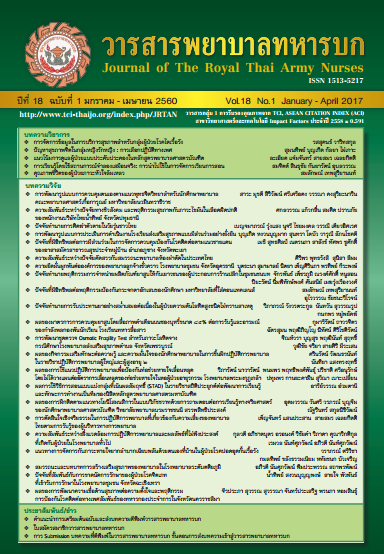การพัฒนารูปแบบการควบคุมตนเองตามแนวพุทธจิตวิทยา สฎหรับนักศึกษาพยาบาล คณะพยาบาลศาสตร์เกื้อการุณย์ มหาวิทยาลัยนวมินทราธิราช
Keywords:
รูปแบบการควบคุมตนเอง, พุทธจิตวิทยา, self-regulation program, Buddhist psychologyAbstract
การศึกษาครั้งนี้ เป็นการวิจัยแบบผสมผสานมีวัตถุประสงค์เพื่อพัฒนารูปแบบการควบคุมตนเองตามแนวพุทธจิตวิทยาในนักศึกษาพยาบาล คณะพยาบาลศาสตร์เกื้อการุณย์ มหาวิทยาลัยนวมินทราธิราช ดำเนินการวิจัยตามแบบแผนวิจัย Two GroupPretest-Posttest Design กลุ่มตัวอย่างเป็นนักศึกษาพยาบาลชั้นปีที่ 1 จำนวน 38 คน กลุ่มควบคุม 19 คน และกลุ่มทดลอง 19 คนโดยใช้กระบวนการปรึกษาเชิงพุทธจิตวิทยาแบบกลุ่ม เครื่องมือที่ใช้คือ แบบประเมินการควบคุมตนเองตามแนวพุทธจิตวิทยาที่ผู้วิจัยพัฒนาจากทฤษฎีการควบคุมตนเองของลีเวนทาลและจอห์นสันร่วมกับหลักธรรมทางพุทธศาสนา 3 หลักคือสติสัมปชัญญะหิริโอตตัปปะและขันติโสรัจจะ ค่าดัชนีความสอดคล้อง 0.94 ค่าความเที่ยงทั้งฉบับ 0.89 วิเคราะห์ข้อมูล ด้วยการแจกแจงความถี่ค่าร้อยละ ค่าเฉลี่ยค่าส่วนเบี่ยงเบนมาตรฐาน สถิติ Paired-t-test และค่าสหสัมพันธ์โดยผลการศึกษาพบว่า นักศึกษากลุ่มทดลองมีคะแนนการควบคุมตนเองสูงกว่าก่อนการเข้าร่วมกิจกรรมอย่างมีนัยสำคัญทางสถิติที่ 0.01 ทั้งด้านสติสัมปชัญญะ ด้านหิริ โอตตัปปะและด้านขันติโสรัจจะ และเมื่อติดตามผลในระยะ 2 เดือนพบว่าคะแนนการควบคุมตนเองมีค่าเฉลี่ยในภาพรวมคงที่ซึ่งแสดงถึงประสิทธิผลและความคงทนของชุดกิจกรรมการวิจัยนี้จึงสามารถสะท้อนได้ว่า รูปแบบการควบคุมตนเองตามแนวพุทธจิตวิทยาที่ผู้วิจัยพัฒนาขึ้นสามารถใช้ในการพัฒนาการควบคุมตนเองของนักศึกษาพยาบาลได้
Development of a Self-Regulation Program Based on the Concept of Buddhist Psychology for Nursing Students at Kuakarun Faculty of Nursing, Navamindradhiraj University
The mixed-methods study aimed at developing a self-regulation program based on the concept of Buddhist psychology with nursing students at the Kuakarun Faculty of Nursing, Navamindradhiraj University. This research was developed employing a two-group pretest-posttest experimental research design. The study sample consisted of 38 first-year undergraduate nursing students, with 19 in the control group and 19 in the experimental group. Group counseling based on the concept of Buddhist psychology was used. The data collection instruments was the Buddhist psychology self-regulation assessment scale developed by the researcher based on the Self-Regulation Theory of Leventhal and Johnson together with three Buddhist principles of Sati-sampajanya, Hiri-ottappa, and Khanti-sorracca. The IOC index was equal to 0.94 and the reliability of the instrument was 0.89. Data were analyzed by means of frequency distribution, percentage, mean, standard deviation, paired t-test, and correlation coefficient, with the significance level set at 0.95. The study findings revealed that the posttest mean score for self-regulation of the experimental group increased with statistical significance at the 0.01 level in terms of Sati-sampajanya, Hiri-ottappa, and Khanti-sorracca. At the two-month follow-up after the end of the experiment, it was found that the mean score of overall self-regulation in the experimental group remained constant, reflecting the effectiveness and the sustainability of the self-regulation program. Based on such findings, it could be concluded that the self-regulation program based on the concept of Buddhist psychology constructed by the researcher could be implemented to promote self-regulation of nursing students.
Downloads
How to Cite
Issue
Section
License
บทความหรือข้อคิดเห็นใดใดที่ปรากฏในวารสารพยาบาลทหารบกเป็นวรรณกรรมของผู้เขียน ซึ่งบรรณาธิการหรือสมาคมพยาบาลทหารบก ไม่จำเป็นต้องเห็นด้วย
บทความที่ได้รับการตีพิมพ์เป็นลิขสิทธิ์ของวารสารพยาบาลทหารบก
The ideas and opinions expressed in the Journal of The Royal Thai Army Nurses are those of the authors and not necessarily those
of the editor or Royal Thai Army Nurses Association.





